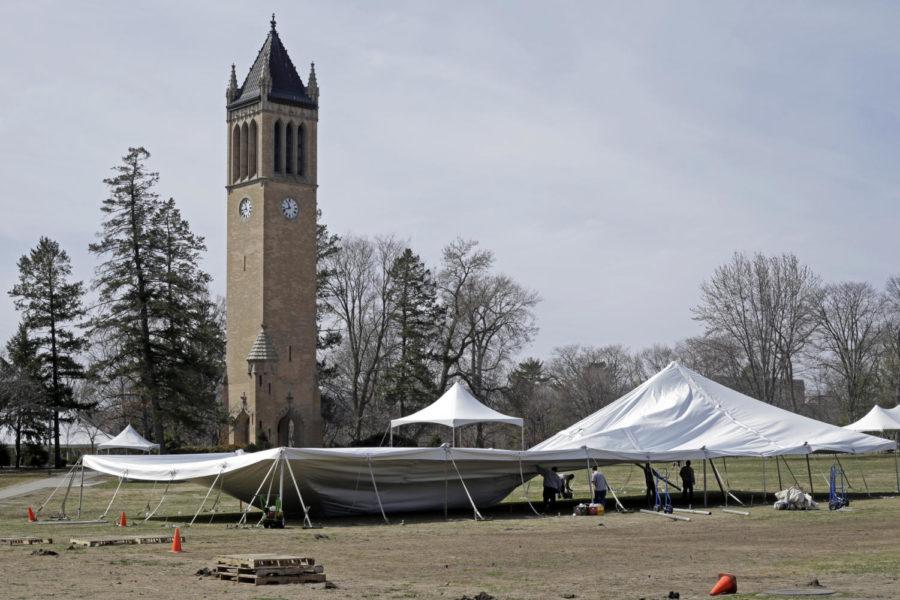- News
- News / Politics And Administration
- News / Politics And Administration / Campus
- News / Student Life
Committee offers Leath new events for students
Brian Achenbach/Iowa State Daily
On April 10, workers began tearing down the tents on central campus that were put there for Veishea. The tents were placed there for food, clubs, organizations and other events.
October 20, 2015
After the Veishea Advisory Committee nixed the idea of any further Veishea-related activities, students were concerned with what opportunities they would have at Iowa State.
At the request of students, a committee made up of faculty and students was formed by President Steven Leath to offer alternative events for students that provide the same community engagement and campus involvement that Veishea offered.
The committee offered six events: a winter welcome-back celebration; a February celebration; a March Madness event; an arts celebration; a college showcase parade; and a community service event. The committee, led by Kevin Schalinske, professor of food science and human nutrition, and Dan Breitbarth, president of student government, along with other faculty and student members.
“These are just six main ideas,” Breitbarth said. “We are likely going to create different events, but these are just the preliminary negotiations that the faculty and students have determined to be a benefit to the university.”
The goal of these events is to give students a way to interact with other students.
“It’s an event to give students a sense of community,” Breitbarth said. “Often times, students don’t interact with very many [students] from other colleges. You get bottled up in your day-to-day activities, unless your roommates are from a different college. It just doesn’t happen as much.”
Tom Hill, senior vice president for student affairs, agrees that it is about student engagement, but the events also provide what he calls “positive aspects from Veishea” that should be retained.
“Things that will provide students with the opportunity to do community service, things that will provide students the chance to develop leadership, to raise money for clubs and organizations, to develop a sense of community,” Hill said. “Those are the things they would focus on.”
The most important thing to remember about this proposal is the lack of relation it has to Veishea.
“Here’s the thing — this isn’t going to happen if we continue to associate this with Veishea,” Breitbarth said, calling the proposed events a “fresh start.”
“Unfortunately it was a package, it was all-or-nothing, and, with that name, you got it all or you got nothing,” Hill said. “With that in mind, you had to distance yourself from it because it had that connotation.”
Breitbarth’s main goal for these events is to bring students the opportunities that aren’t available to them anymore.
Breitbarth said they tried to identify three big things apart of new events: collegiate engagement, community engagement and alumni engagement.
The next step is for Leath to revise the proposed events. When reached for comment, Leath had yet to read the draft and therefore couldn’t offer a comment.
However, Leath’s response is not expected to be negative, Breitbarth said.
“He said in his fall address that this is something he cares about,” Breitbarth said. “I don’t think he’ll take it negatively in any way, shape or form.”
Hill said that with or without Leath’s blessing, there is a way to move forward with this project.
“Typically, if they don’t get his blessing, he would have concerns with it, and he will make it very clear what those concerns are,” Hill said, adding that not just Leath but he as well is willing to work toward a solution.
“Keep pushing let us know what we can do to help,” he said.
The Ames community has been receptive of the proposed ideas as well. Breitbarth and Megan Sweere, vice president of student government, met with Ames Mayor Ann Campbell to discuss how the community would be involved.
“She seemed receptive,” Breitbarth said. “They’re always willing to have the discussion. It’s not like they’re frowning on us for creating an opportunity for students and alumni and community members.”
The new ideas are not focused on an economic opportunity, as Veishea was when it involved the whole community, because Breitbarth’s goal is the students.
Hill hopes these events can set a precedence for years to come.
“The whole thought about it is to put students in the position in 2015 to start things that would become a tradition as they did in 1922 when Veishea got started.”
Schalinske said the committee worked hard throughout the summer and fall semester to come up with thoughtful ideas, new or old, which they could propose for the future.
As for opponents to these suggestions, Hill says there will always be naysayers.
“To say no one will have a different opinion would be silly,” Hill said. “I expect it and if we don’t get it I’ll be shocked quite frankly.”
However, there is not a lot to be upset about right now, as the plan is still in the works and Hill says “we are moving in the right direction.”
Breitbarth said the events are open for suggestions.
“It’s an ongoing discussion so if anyone has got input of any sort, I’d be more than willing to sit down and have a conversation about it,” he said.
Students can expect to see big changes following Leath’s opportunity to look the proposal over. If he agrees, events can be scheduled immediately in the spring semester.
“There will be more opportunity for students to engage with others this spring,” Breitbarth said. “In what capacity, I don’t know, but there will be something that will be accomplished by this spring.”

















